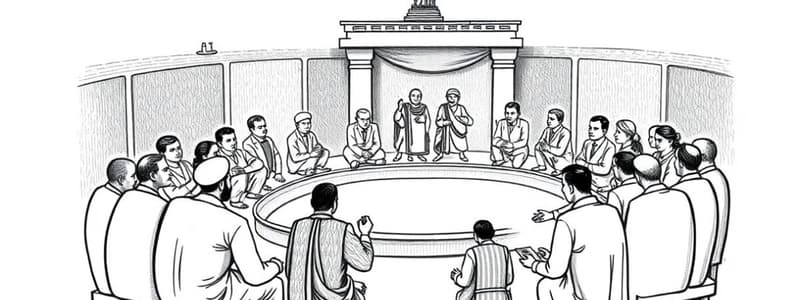Podcast
Questions and Answers
What is the primary purpose of a Constitution?
What is the primary purpose of a Constitution?
It lays out ideals that form the basis of the country and serves as a set of rules and principles for governance.
When was the Constituent Assembly of India elected?
When was the Constituent Assembly of India elected?
- 1935
- 1947
- 1946 (correct)
- 1927
The Simon Commission included Indian representatives.
The Simon Commission included Indian representatives.
False (B)
Who moved the resolution calling for the Constitution to be framed by the Congress in May 1927?
Who moved the resolution calling for the Constitution to be framed by the Congress in May 1927?
The report submitted by Motilal Nehru's committee became famous as the _______.
The report submitted by Motilal Nehru's committee became famous as the _______.
What principle did the Nehru Report assert regarding sovereignty?
What principle did the Nehru Report assert regarding sovereignty?
The Third Round Table Conference successfully implemented constitutional reforms in India.
The Third Round Table Conference successfully implemented constitutional reforms in India.
Match the following events with their significance:
Match the following events with their significance:
Flashcards
What is a Constitution?
What is a Constitution?
A foundational document outlining a country's ideals and governance principles.
Constituent Assembly of India
Constituent Assembly of India
A committee elected in 1946 to draft the Constitution of India.
What was the Nehru Report?
What was the Nehru Report?
An early attempt by Indians to frame a Constitution, advocating for sovereignty, fundamental rights, and a federal system.
Motilal Nehru Resolution (1928)
Motilal Nehru Resolution (1928)
Signup and view all the flashcards
What was the Simon Commission (1927)?
What was the Simon Commission (1927)?
Signup and view all the flashcards
Lucknow Session Resolution (1936)
Lucknow Session Resolution (1936)
Signup and view all the flashcards
What are the key elements of the Nehru report?
What are the key elements of the Nehru report?
Signup and view all the flashcards
Study Notes
Introduction to the Indian Constitution
- Constitutions serve as foundational documents, outlining the ideals and governance principles for a country.
- India's Constitution-making began prior to independence in 1947, influenced by various British legislative acts.
- Key acts included the Government of India Act (1858, 1919, 1935) and several Indian Council Acts (1861, 1892, 1909).
- The Constituent Assembly of India was elected in 1946 to draft the Constitution.
Objectives of Constitution Making
- The push for Indian self-governance and creating a Constitution was influenced by historical events and resolutions.
- The Motilal Nehru Resolution (1928) marked a significant moment, advocating for an Indian-framed Constitution, reflecting national aspirations.
- The Simon Commission (1927) was composed solely of British members, prompting Indian demands for representation in constitutional processes.
- The Indian National Congress under Motilal Nehru's leadership moved a resolution in 1927 urging the drafting of a Constitution by Indians with input from elected representatives.
Key Developments Leading to the Constituent Assembly
- The Nehru Report, submitted in 1928, was the first Indian attempt at creating a national Constitution, emphasizing:
- Sovereignty belonging to Indians.
- Fundamental Rights and the need for a federal system with unit autonomy.
- A parliamentary government structure.
- The Third Round Table Conference's proposals highlighted British reluctance to grant constitutional power directly to Indians.
- The Congress Working Committee advocated for a Constituent Assembly elected through adult suffrage in response to the inadequacies of past constitutional attempts.
Transition to the Constituent Assembly
- The failure of previous efforts (e.g., Simon Commission, Round Table Conference) reinforced the demand for an Indian Constituent Assembly.
- During Congress’s Lucknow Session (1936), a resolution was passed rejecting any constitution imposed by foreign entities.
- The resolution emphasized that only a Constitution created by an Indian Constituent Assembly elected by the populace could be valid.
Studying That Suits You
Use AI to generate personalized quizzes and flashcards to suit your learning preferences.




